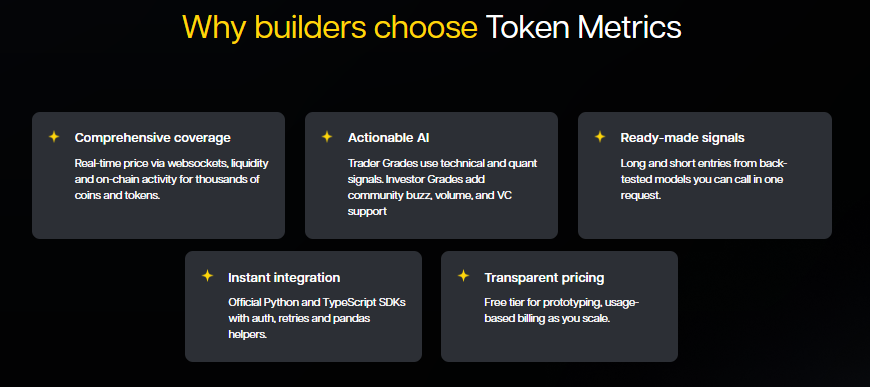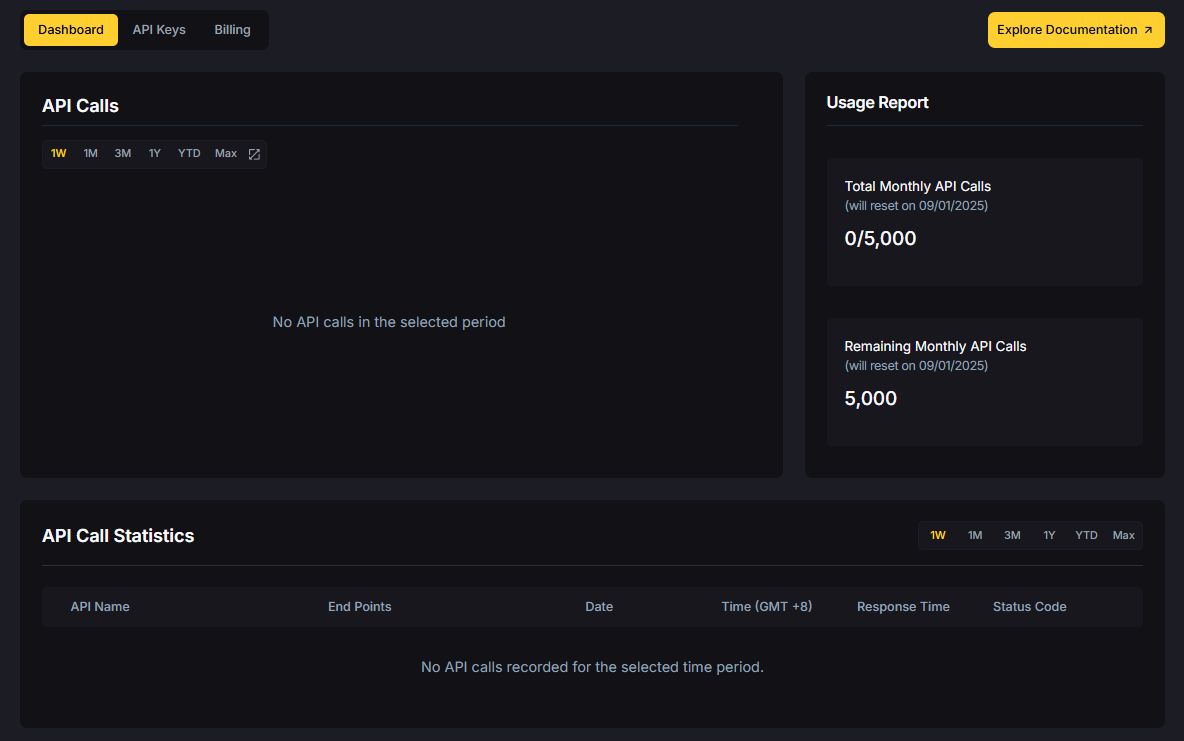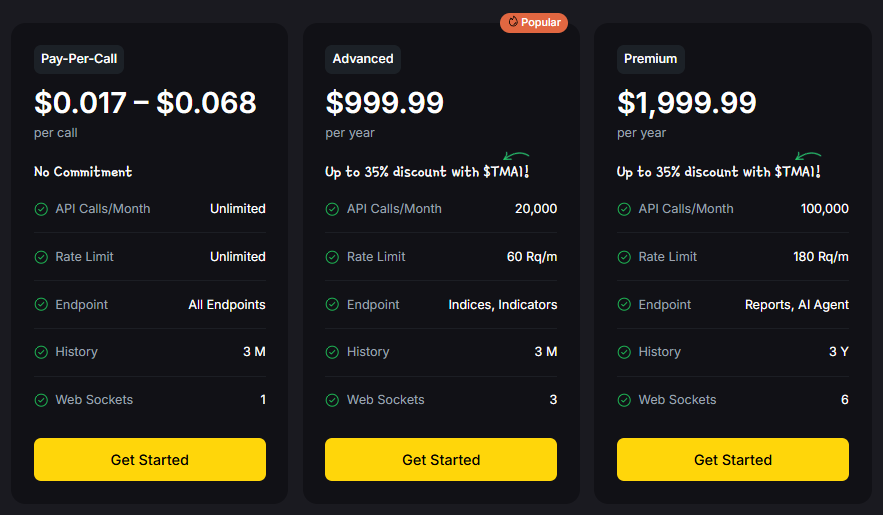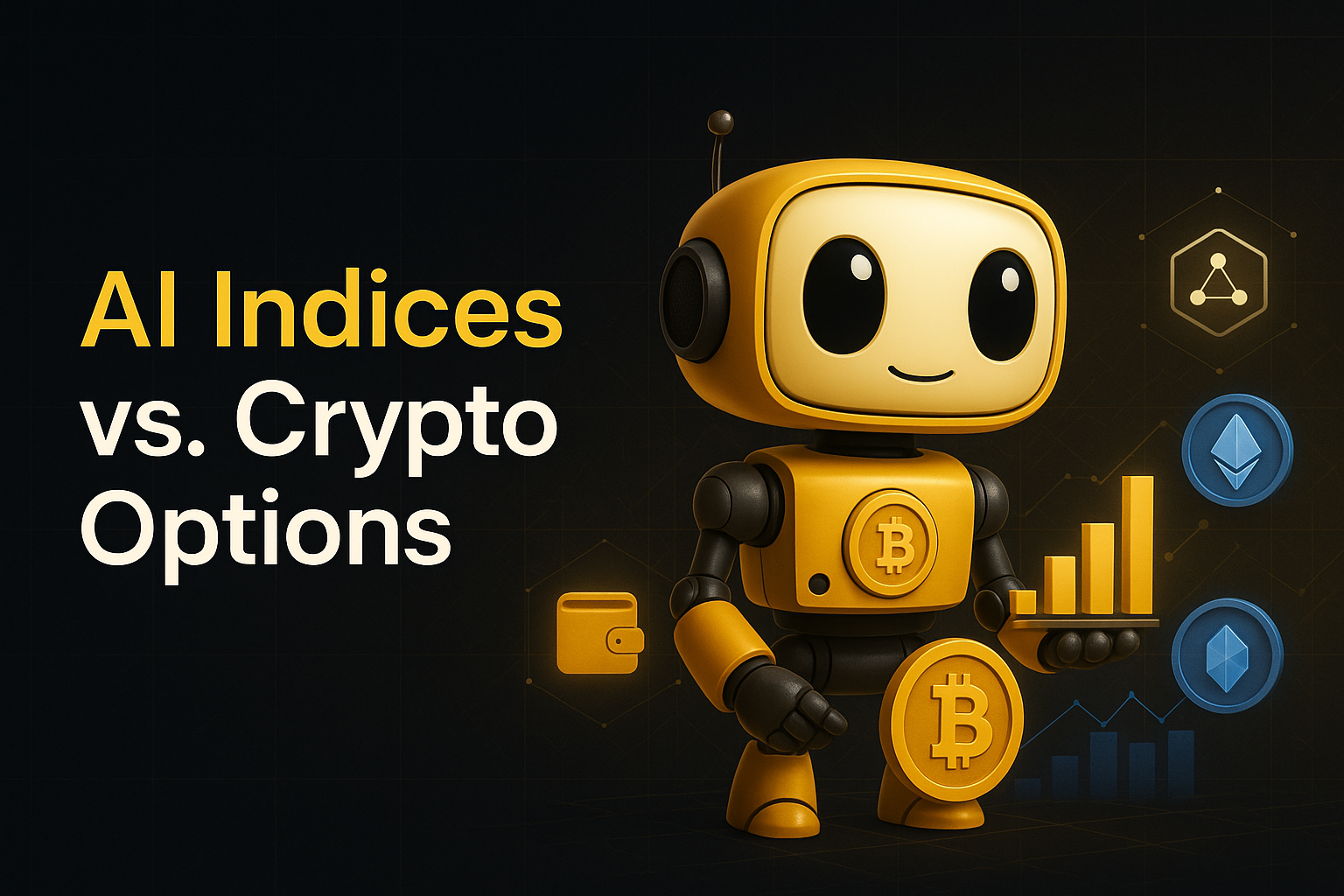Making the Right Choice for Your Crypto Investment Journey
The cryptocurrency investment landscape offers numerous options for gaining exposure to digital assets. From directly purchasing individual tokens to investing in crypto ETFs, from using robo-advisors to following social trading platforms, each approach presents unique advantages and drawbacks. For investors exploring cryptocurrency, understanding these options and their trade-offs is essential for making informed decisions aligned with personal goals, risk tolerance, and circumstances.
Token Metrics AI Indices represent one compelling approach to crypto investing, but how do they compare to alternatives? This comprehensive comparison examines the major crypto investment options available today, analyzing each method's strengths, weaknesses, costs, and suitability for different investor profiles. Whether you're a complete beginner or an experienced investor reevaluating your strategy, this guide provides the clarity needed to choose the optimal approach for your situation.
Direct Token Purchases (DIY Approach)
How It Works
The most straightforward crypto investment method involves directly purchasing individual cryptocurrencies through exchanges like Coinbase, Binance, or Kraken. You select specific tokens based on your research, buy them with fiat currency or other cryptocurrencies, and store them in wallets under your control.
This approach offers maximum flexibility and control. You choose exactly which cryptocurrencies to hold, when to buy or sell, and how to allocate capital across your portfolio. Many crypto purists prefer this method, believing it aligns with cryptocurrency's decentralized philosophy.
Advantages
Direct token purchases provide complete control over investment decisions and timing. You're not constrained by fund rules, rebalancing schedules, or third-party decisions. If you identify an opportunity, you can act immediately without waiting for index updates or fund manager decisions.
Cost efficiency can be high if you trade infrequently. While exchanges charge trading fees typically ranging from 0.1% to 0.5% per transaction, you avoid ongoing management fees associated with funds or advisory services. For long-term holders making few trades, this cost structure proves economical.
Learning opportunities are substantial when managing your own portfolio. You develop deep understanding of blockchain technology, tokenomics, market dynamics, and portfolio management through hands-on experience. This knowledge serves you well across your investment lifetime.
Disadvantages
The time commitment is enormous. Effective DIY crypto investing requires researching hundreds of potential tokens, monitoring news and developments constantly, analyzing technical charts and on-chain data, tracking portfolio performance and rebalancing needs, and managing tax reporting for potentially hundreds of transactions.
Most investors underestimate this commitment, spending 10-20 hours weekly on crypto management. For professionals with demanding careers, this time investment often proves unsustainable.
Emotional decision-making plagues DIY investors. Without systematic frameworks, fear and greed dominate decisions. Studies consistently show that self-directed crypto investors underperform systematic strategies by significant margins primarily due to poor timing driven by emotions.
The knowledge barrier is high. Understanding blockchain technology, evaluating smart contracts, analyzing tokenomics, and interpreting on-chain data requires substantial technical expertise. Most investors lack this background, leading to poor investment decisions.
Best For
DIY investing suits experienced investors with significant time availability, strong emotional discipline, technical expertise in blockchain and finance, and genuine interest in cryptocurrency beyond just returns. If crypto is your hobby and you enjoy the research process, DIY investing can be rewarding.
Cryptocurrency Exchange-Traded Funds (ETFs)
How It Works
Cryptocurrency ETFs are investment funds that trade on traditional stock exchanges like the NYSE or NASDAQ. These funds hold cryptocurrencies or cryptocurrency-related assets, allowing investors to gain crypto exposure through familiar brokerage accounts without directly purchasing or storing digital assets.
Bitcoin ETFs, Ethereum ETFs, and diversified crypto ETFs tracking multiple tokens have launched in various jurisdictions. Investors buy ETF shares just like stocks, with the fund managing underlying cryptocurrency holdings.
Advantages
Simplicity and familiarity make ETFs attractive. You invest through existing brokerage accounts using processes you already understand. No need to set up crypto wallets, manage private keys, or navigate cryptocurrency exchanges.
Regulatory oversight provides comfort for conservative investors. ETFs operate under securities regulations with disclosure requirements, investor protections, and oversight absent in pure cryptocurrency markets. This structure appeals to risk-averse investors and institutions.
Tax efficiency can be superior in some jurisdictions. In retirement accounts like IRAs or 401(k)s, ETF investments grow tax-deferred without triggering taxable events from rebalancing or trading.
Disadvantages
Limited availability restricts options. While Bitcoin and Ethereum ETFs exist in some markets, diversified crypto ETFs remain rare. Most ETFs provide exposure only to the largest cryptocurrencies, missing opportunities in altcoins and emerging projects.
Management fees reduce returns. Crypto ETFs typically charge annual expense ratios of 0.5% to 2.5%, significantly higher than traditional stock market ETFs. Over time, these fees substantially impact compound returns.
Premium/discount issues affect some crypto ETFs. When ETF trading prices diverge from underlying asset values, investors may buy at premiums during enthusiasm or sell at discounts during fear, creating tracking errors.
Lack of customization limits strategy implementation. You're restricted to the ETF's predetermined holdings and methodology. If you disagree with the fund's approach or want specialized exposure, you have no flexibility.
Best For
Crypto ETFs work well for conservative investors prioritizing simplicity over optimization, those wanting crypto exposure within retirement accounts, investors preferring regulated investment vehicles, and individuals with small allocations where ETF simplicity outweighs fee disadvantages.
Crypto Robo-Advisors and Auto-Investing Platforms
How It Works
Crypto robo-advisors and automated investing platforms use algorithms to build and manage cryptocurrency portfolios based on your risk profile and goals. Platforms like Coinbase's auto-investing feature or specialized crypto robo-advisors handle portfolio construction, rebalancing, and optimization automatically.
These services typically involve completing risk assessment questionnaires, receiving algorithm-generated portfolio recommendations, and having the platform automatically execute trades and rebalancing.
Advantages
Automation reduces time commitment significantly. Once configured, robo-advisors handle portfolio management without requiring constant attention. You benefit from systematic strategies without active involvement.
Lower fees than traditional advisors make robo-advisors accessible. While not free, robo-advisor fees typically run 0.25% to 1% annually—less than human financial advisors charging 1% to 2%.
Algorithmic discipline removes emotions from investing. Like Token Metrics, robo-advisors follow systematic rules regardless of market sentiment, helping investors avoid emotional mistakes.
Disadvantages
Limited sophistication characterizes most crypto robo-advisors. The algorithms typically use basic strategies like market-cap weighting or simple risk-tolerance adjustments. They lack the advanced artificial intelligence and comprehensive analysis that platforms like Token Metrics provide.
Generic portfolios don't account for individual circumstances beyond basic risk tolerance. Most robo-advisors create cookie-cutter portfolios that may not align with your specific goals, tax situation, or market views.
Platform limitations restrict crypto selection. Robo-advisors typically work with limited token selections available on their platforms, missing opportunities in the broader crypto market.
Best For
Crypto robo-advisors suit investors wanting more sophistication than DIY but less cost than human advisors, those comfortable with algorithmic strategies but seeking simplicity, and individuals with straightforward investment needs without complex requirements.
Crypto Hedge Funds and Private Funds
How It Works
Cryptocurrency hedge funds and private investment funds pool capital from multiple investors and employ professional managers who actively trade cryptocurrencies, use sophisticated strategies including derivatives and arbitrage, and aim to deliver returns exceeding market benchmarks.
These funds typically require substantial minimum investments ($50,000 to $500,000+) and restrict access to accredited investors meeting income or net worth requirements.
Advantages
Professional management provides expertise and full-time attention. Experienced crypto fund managers bring years of market knowledge, industry connections, and sophisticated strategies individual investors cannot replicate.
Advanced strategies available to hedge funds include derivatives trading, arbitrage opportunities, and market-neutral strategies that can potentially profit in various market conditions beyond simple long-only positions.
Potential for exceptional returns exists with top-performing managers. Elite crypto hedge funds have delivered multi-thousand percent returns during bull markets, far exceeding passive approaches.
Disadvantages
High fees significantly reduce net returns. Crypto hedge funds typically charge the "2 and 20" structure—2% annual management fee plus 20% performance fee on profits. These fees dramatically reduce investor returns compared to lower-cost alternatives.
Minimum investment requirements exclude most investors. With minimums often exceeding $100,000, hedge funds remain inaccessible for average investors.
Lock-up periods restrict liquidity. Many crypto funds require capital commitments of 1-3 years with limited redemption opportunities. During this period, you cannot access your investment regardless of personal needs or market conditions.
Variable performance quality creates risk. While top funds perform exceptionally, many crypto hedge funds underperform simple buy-and-hold strategies after fees. Selecting winning managers proves extremely difficult.
Best For
Crypto hedge funds suit high-net-worth individuals seeking professional management and willing to pay premium fees, accredited investors who can meet minimum requirements, and those with long investment horizons tolerating lock-up periods.
Token Metrics AI Indices
How It Works
Token Metrics AI Indices combine artificial intelligence, professional analysis, and systematic strategies to create model portfolios across different risk profiles and investment styles. The platform's machine learning algorithms analyze over 6,000 cryptocurrencies continuously, evaluate technical and fundamental factors, identify high-quality opportunities while filtering scams, and provide rebalancing guidance based on systematic criteria.
Investors select indices matching their objectives and risk tolerance, then implement the model portfolios either manually or through integrated trading features.
Advantages
AI-powered analysis surpasses human capabilities in scale and consistency. Token Metrics' algorithms process vast datasets continuously, identifying patterns and opportunities individual investors would miss. The AI operates without emotional bias, maintaining discipline through market volatility.
Comprehensive due diligence is built into the process. The platform's multi-layered analysis examines code quality, team credentials, tokenomics, sentiment, and technical indicators—institutional-grade research accessible to retail investors.
Flexibility across investment styles serves diverse needs. Whether you're conservative preferring large-cap stability, aggressive seeking growth opportunities, or interested in sector-specific themes, Token Metrics offers indices aligned with your approach.
Transparent methodology builds trust and understanding. Unlike black-box algorithms, Token Metrics clearly explains index strategies, holdings, and decision criteria. You understand what you're investing in and why.
Cost efficiency compared to alternatives is significant. Token Metrics subscription fees are substantially lower than hedge fund fees or financial advisor charges while providing sophisticated analysis exceeding basic robo-advisors.
Educational resources support investor development. Beyond just providing indices, Token Metrics offers tutorials, webinars, research, and analytics helping investors understand cryptocurrency markets and improve decision-making.
Disadvantages
Implementation responsibility remains with investors in most cases. Unlike fully automated solutions, you typically need to execute trades manually based on index recommendations, requiring some active involvement.
Subscription costs exist, though modest compared to alternatives. While far less than hedge funds or financial advisors, Token Metrics charges monthly or annual subscription fees that free DIY approaches don't require.
Learning curve for platform features means new users need time familiarizing themselves with Token Metrics' tools, indices, and analytics. While comprehensive tutorials help, initial setup requires effort.
Best For
Token Metrics AI Indices are ideal for serious crypto investors wanting institutional-quality analysis without institutional fees, those seeking systematic strategies but maintaining implementation control, investors across experience levels from beginners to experts, and anyone wanting to optimize crypto investing while preserving time for other priorities.
Comparison Matrix: Key Factors
Cost Comparison
Examining costs across options reveals significant differences. DIY investing features low trading fees (0.1%-0.5% per trade) but high opportunity costs from time investment. Crypto ETFs charge 0.5%-2.5% annual fees with no time commitment. Robo-advisors run 0.25%-1% annually with minimal time needs. Hedge funds demand 2% annual plus 20% performance fees with no time requirement. Token Metrics charges modest subscription fees ($50-$500 monthly depending on tier) with limited time commitment.
For serious investors with substantial capital, Token Metrics' cost structure provides exceptional value—sophisticated analysis at a fraction of hedge fund fees.
Time Commitment Comparison
Time requirements vary dramatically. DIY investing demands 10-20 hours weekly for proper portfolio management. Crypto ETFs require virtually no ongoing time beyond periodic performance review. Robo-advisors need initial setup (1-2 hours) then minimal ongoing involvement. Hedge funds require only capital allocation with zero time commitment. Token Metrics needs initial setup and learning (3-5 hours) then 1-2 hours monthly for review and implementation.
For busy professionals, Token Metrics optimizes the time-value tradeoff—far less time than DIY while maintaining strategic control.
Sophistication and Performance Potential
Sophistication levels differ substantially. DIY investing's sophistication depends entirely on individual expertise—potentially high for experts, typically low for most. Crypto ETFs offer basic market exposure with limited strategy sophistication. Robo-advisors provide moderate algorithmic sophistication using standard portfolio theory. Hedge funds can deliver high sophistication with advanced strategies, though quality varies widely. Token Metrics provides high sophistication through AI and professional analysis accessible to all users.
Performance potential correlates with sophistication but also depends on execution, timing, and market conditions.
Accessibility and Minimums
Accessibility varies significantly. DIY investing has no minimums—start with any amount. Crypto ETFs require only brokerage account minimums (often $0-$100). Robo-advisors typically have $500-$1,000 minimums. Hedge funds demand $50,000-$500,000+ minimums restricting access severely. Token Metrics is accessible with just subscription fees plus whatever capital you choose to invest.
This accessibility democratizes sophisticated crypto investing previously reserved for wealthy individuals.
Making Your Decision: Which Option Is Right for You?
For Complete Beginners
If you're new to cryptocurrency and investing generally, consider Token Metrics AI Indices or crypto ETFs. Both provide systematic exposure without requiring deep expertise. Token Metrics offers superior sophistication and learning opportunities, while ETFs provide ultimate simplicity through familiar brokerage accounts.
Avoid DIY investing until you've built foundational knowledge. The learning curve and emotional challenges prove too severe for most beginners attempting independent portfolio management.
For Busy Professionals
If you have limited time but want serious crypto exposure, Token Metrics AI Indices or crypto ETFs are optimal. Both minimize time commitment while providing systematic strategies. Token Metrics delivers far superior sophistication and potential returns, making it the better choice for those willing to invest a few hours monthly.
Hedge funds work only if you meet minimum requirements and accept high fees. Robo-advisors provide middle-ground options but with less sophistication than Token Metrics.
For Hands-On Investors
If you enjoy research and active management, consider combining DIY investing with Token Metrics indices. Use indices for core portfolio exposure providing systematic strategy, then allocate smaller portions to individual tokens you've thoroughly researched.
This hybrid approach lets you pursue interests and convictions while maintaining professional management for most capital.
For Conservative Investors
If you prioritize safety and simplicity over optimization, crypto ETFs or large-cap focused Token Metrics indices work best. ETFs provide regulatory oversight and familiar structure. Token Metrics large-cap indices offer more sophistication while focusing on established cryptocurrencies with lower volatility.
Avoid speculative approaches like small-cap DIY investing or aggressive hedge funds until your risk tolerance increases.
For Experienced Investors
If you're experienced with investments and want to optimize crypto exposure, Token Metrics AI Indices provide the ideal combination of sophistication, control, and efficiency. The platform's AI enhances your own expertise rather than replacing it.
Consider combining Token Metrics indices with selective DIY positions where you have specialized knowledge or high conviction.
The Optimal Path for Most Investors
After examining all major crypto investment options, Token Metrics AI Indices emerge as the optimal choice for most investors across experience levels, time availability, and capital sizes. The platform combines institutional-quality analysis with retail accessibility, sophisticated strategies with reasonable costs, and systematic discipline with strategic flexibility.
While no single solution suits everyone—conservative investors might prefer ETF simplicity, while crypto enthusiasts might enjoy DIY engagement—Token Metrics serves the broadest range of investors effectively. Whether you're a beginner seeking guidance, a professional lacking time, or an expert wanting to optimize strategy, Token Metrics provides the tools, intelligence, and framework for successful crypto investing.
The cryptocurrency opportunity continues evolving, with blockchain technology transforming finance globally. Participating successfully requires smart tools, systematic strategies, and disciplined execution. Token Metrics AI Indices deliver all three, positioning you for long-term success in one of the most dynamic investment opportunities available.
Your crypto investment journey deserves the right foundation. Choose wisely based on your unique circumstances, but recognize that Token Metrics offers compelling advantages for serious investors committed to building lasting wealth in cryptocurrency markets.








.svg)


.png)




%201.svg)
%201.svg)


%201.svg)









.svg)




.png)